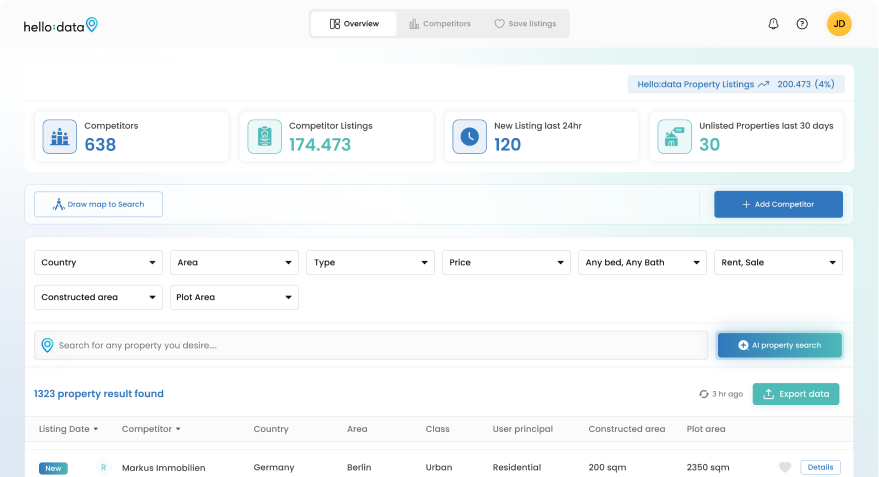Introduction
What is SEC Form D and how is it used in real estate syndications?
SEC Form D is a crucial document filed with the U.S. Securities and Exchange Commission (SEC) during private securities offerings. It serves as a notice of exempt offerings under Regulation D, allowing real estate syndicators to raise capital from accredited investors while bypassing some of the more rigorous requirements of public offerings.
Understanding and utilizing SEC Form D can enhance investor confidence by demonstrating compliance with regulatory frameworks. This assurance is vital for successful capital raising in the competitive real estate market.
Key benefits include:
- Streamlined fundraising: Attract accredited investors quickly.
- Regulatory compliance: Maintain adherence to federal securities laws.
- Increased credibility: Foster trust among potential investors.
Navigating the complexities of SEC Form D compliance can be daunting. That’s where Hello:Here comes in. This innovative proptech solution simplifies the process, ensuring that real estate syndicators stay informed and compliant. By leveraging technology, Hello:Here empowers you to focus on what matters most—growing your real estate investments and building lasting relationships with investors.
Moreover, understanding concepts like As Stabilized Value in real estate investments can significantly enhance decision-making processes. This term refers to the estimated value of a property once it has reached its optimal state after renovations or improvements.
Staying updated on industry trends is also crucial. For instance, knowing the best sources of real estate news can provide valuable insights into market shifts influenced by economic changes, policy alterations, or emerging technologies.
Furthermore, being aware of investment opportunities such as Opportunity Zones can offer significant tax incentives for investors willing to invest in economically distressed areas.
In this digital age, leveraging advanced technologies like AI can streamline processes such as property searches. For instance, an AI Property Search feature can transform the way renters and landlords navigate the real estate market by making property search easier and more efficient.
Lastly, understanding the implications of AI in real estate is becoming increasingly important. Knowing the difference between Black Box AI and Explainable AI (XAI) models could provide valuable insights into how these technologies can be utilized effectively in the industry.
Understanding SEC Form D
SEC Form D is a crucial document filed with the U.S. Securities and Exchange Commission (SEC) that serves as a notice of exempt offerings of securities. This form is specifically designed for private securities offerings, allowing companies to raise capital without the burdensome requirements associated with public offerings.
Purpose of SEC Form D
The primary purpose of SEC Form D includes:
- Regulatory Compliance: By filing this form, real estate syndicators declare their intent to offer securities under Regulation D exemptions.
- Investor Transparency: It provides potential investors with essential information about the offering, promoting transparency and trust.
- Legal Protection: Timely and accurate filings can afford syndicators safe harbor protections from certain liabilities.
Overview of Regulation D
Regulation D plays a vital role in private placements by providing specific exemptions that allow businesses to avoid extensive registration processes. Here are key aspects relevant to real estate syndicators:
- Flexibility in Fundraising: Regulation D allows for various fundraising strategies while minimizing regulatory barriers.
- Investor Limitations: Under different rules within Regulation D, such as Rule 506(b) and Rule 506(c), there are specific conditions regarding investor qualifications.
- Attracting Diverse Investors: These exemptions enable syndicators to reach accredited investors and, depending on the rule provision, even non-accredited investors under certain conditions.
Real estate syndicators can leverage SEC Form D and Regulation D exemptions to enhance their capital raising efforts, streamline processes, and build investor confidence. This understanding is crucial for navigating the complexities of raising funds effectively within the real estate market.
In addition to these regulatory aspects, it’s also essential for real estate investors to understand concepts like liquidity in real estate, which refers to how quickly and easily a property can be bought or sold without significantly impacting its price. Furthermore, grasping the role of economic base in real estate investments can provide valuable insights into the financial stability and growth potential of a region’s real estate market.
Exploring Regulation D Exemptions
Understanding the details of Regulation D is crucial for real estate syndicators. Two important exemptions within this regulation—Rule 506(b) and Rule 506(c)—offer different ways to raise capital while complying with SEC requirements.
Rule 506(b) Explained
Rule 506(b) allows issuers to raise unlimited capital from accredited investors and up to 35 non-accredited investors, provided certain conditions are met:
- Investor Verification: There is no requirement for general solicitation or advertising. This means you can market your offering directly to a select group of investors without publicly promoting it.
- Investment Sophistication: Non-accredited investors must possess sufficient knowledge and experience in financial matters to evaluate the merits of the investment.
Using Rule 506(b) offers several advantages for real estate syndications:
- Targeted Approach: Syndicators can maintain a more personalized relationship with potential investors, fostering trust and confidence.
- Flexibility in Offerings: The ability to include non-accredited investors opens opportunities for a broader base of support.
For example, a successful multifamily housing project might leverage Rule 506(b) to attract both seasoned high-net-worth individuals and local community members eager to invest in their neighborhood. In such scenarios, utilizing advanced payment platforms like ClickPay could streamline the process of collecting rent and managing finances.
Rule 506(c) Overview
Switching gears to Rule 506(c), this exemption enables general solicitation of accredited investors, expanding the marketing reach significantly. However, it comes with its own set of requirements:
- Verification Process: Issuers must take reasonable steps to verify that all investors are accredited. This often involves collecting documentation such as tax returns or bank statements.
- Total Access for Accredited Investors Only: Unlike Rule 506(b), participation in offerings under Rule 506(c) is restricted solely to accredited investors. This limitation may reduce inclusivity but allows for larger capital raises from experienced participants.
The implications of utilizing Rule 506(c) can be substantial:
- Expanded Marketing Strategies: Syndicators can utilize online platforms, social media, and other marketing tools to reach a broader audience effectively.
- Potentially Greater Capital Influx: By focusing exclusively on accredited investors, there’s often an opportunity for larger sums of investment due to their financial capacity.
In practice, a real estate developer aiming for a significant commercial property acquisition could opt for Rule 506(c), using targeted online campaigns to attract affluent investors looking for exclusive opportunities. Furthermore, the integration of AI technology into real estate practices is changing rental listings, making it easier for developers and syndicators alike to connect with potential tenants or buyers.
Navigating these two rules provides critical options for real estate syndicators. Understanding how each rule aligns with your fundraising strategy is essential.
The Role of SEC Form D in Real Estate Syndications
Understanding the filing procedures for SEC Form D is crucial for real estate syndicators. This form serves as a notice of exempt offering of securities under Regulation D, enabling companies to raise capital while remaining compliant with SEC regulations.
Importance of Timely Filing
Timely filing of SEC Form D is essential for several reasons:
- Safe Harbor Exemptions: By filing Form D promptly, syndicators can secure safe harbor exemptions from certain registration requirements. This protection allows them to raise funds without facing immediate regulatory scrutiny.
- Investor Confidence: A timely filing reflects professionalism and adherence to legal standards, enhancing investor confidence. Investors are more likely to engage with syndicators who demonstrate compliance.
Process for Filing Form D
The process for filing Form D involves several key steps:
- Gather Required Information: Accurate details about the offering must be compiled, including:
- The name and address of the issuer
- The amount being raised
- A description of the business and its operations
- Information about the management team and their experience
- File with the SEC:
- Electronic submission through the EDGAR system is mandatory.
- The form must be filed within 15 days after the first sale of securities.
- State Filings: Depending on where investors reside, additional state filings may be required to comply with local regulations.
By adhering to these compliance requirements for private offerings, syndicators ensure that they meet both federal and state regulations, paving the way for successful capital raising efforts. Understanding how SEC Form D functions within real estate syndications is vital for navigating this complex landscape effectively.
In addition to regulatory compliance, it’s also important for real estate syndicators to leverage data analytics tools effectively. For instance, utilizing SFR analytics tools can provide precise and actionable data crucial for making informed investment decisions. Moreover, understanding breakeven occupancy is essential as it represents the minimum occupancy level required for a property to cover its operating expenses and debt service without incurring losses.
Furthermore, incorporating advanced technologies such as artificial intelligence into real estate operations can revolutionize every aspect of buying, selling, and managing properties. Understanding market trends through sentiment analysis can provide valuable insights that aid in making strategic decisions.
Lastly, with the rise of platforms like Airbnb, it’s also important to compare different rental options. An analysis of AirBNB Plus vs traditional rentals can help investors understand which option might yield better returns in specific market conditions.
Legal Consequences of Non-compliance with SEC Regulations
Navigating the complex landscape of SEC regulations is essential for real estate syndicators. Failing to comply with these regulations can lead to significant legal pitfalls in real estate syndications. Here are some critical risks associated with non-compliance:
1. Failure to File
Not submitting SEC Form D on time can result in the loss of exemption from registration. This exposes syndicators to the risk of legal actions from investors and regulatory bodies.
2. Inaccurate Filings
Misrepresentations or errors on Form D can trigger investigations by the SEC. These inaccuracies may result in civil penalties under Reg D, which can severely impact your reputation and future fundraising efforts.
3. Investor Legal Action
Investors who feel misled due to improper filings might pursue legal recourse against the syndicator, leading to costly litigation and potential financial losses.
4. Loss of Investor Confidence
Non-compliance erodes trust among potential investors. Once lost, this confidence is hard to regain, affecting future deals.
Understanding these consequences emphasizes the importance of diligent compliance practices. Real estate syndicators must prioritize accurate and timely filings to protect their interests and maintain a strong standing in the market. Adopting robust compliance strategies not only safeguards against legal repercussions but also fosters a transparent investment environment that attracts serious investors.
Building Investor Trust through Transparency: The Case for Timely Filings
Timely and accurate filings are essential for maintaining transparency in real estate syndications. When syndicators follow SEC regulations, they not only meet legal obligations but also build investor trust. This trust is vital in capital markets, where credibility and accountability are key to establishing relationships.
Key aspects include:
- Investor Protections: Under Regulation D, timely filings safeguard investors by ensuring they receive pertinent information about their investments. This transparency helps mitigate risks associated with private offerings.
- Establishing Trust: Accurate disclosures reassure investors that syndicators prioritize compliance and ethical practices. When investors see that a syndicator takes filing deadlines seriously, it enhances their perception of reliability and professionalism.
- Promoting Open Communication: Regular updates and disclosures keep investors informed about project progress. This open line of communication strengthens relationships and encourages long-term partnerships.
- Attracting New Investors: A robust reputation for compliance can differentiate a syndicator in a competitive market. Potential investors are more likely to engage with a syndicator known for its integrity and adherence to regulations.
In the ever-changing world of real estate, using timely SEC Form D filings can greatly improve the relationship between syndicators and investors. By being transparent, syndicators not only protect their investors but also create an environment that encourages growth and innovation.
This is especially important in areas such as multifamily housing where the Build-To-Rent (BTR) concept is becoming more popular.
How Hello:Here Helps You Follow SEC Rules
Hello:Here is a proptech solution changing the game for real estate syndications. This innovative platform uses technology to make compliance with SEC regulations easier and better for syndicators dealing with the complexities of these rules.
Key Features of Hello:Here
1. AI-Powered Real Estate App for Compliance
The application integrates advanced AI capabilities, such as Support Vector Machines, streamlining compliance tasks through automation and intelligent data management.
2. Hello Data Property Tracking
This powerful tool offers comprehensive data aggregation, ensuring that real estate professionals have access to vital information at their fingertips.
Compliance Made Easy
Following SEC regulations on time is crucial. Hello Data Property Tracking helps with this by providing:
- Automated Reminders: The app sends notifications for filing deadlines related to SEC Form D. This proactive approach minimizes the risk of missing key dates, an essential aspect of maintaining compliance.
- Data Aggregation Capabilities: By compiling diverse datasets, Hello:Here simplifies the process of gathering necessary information for SEC filings. Users can easily access critical data points relevant to real estate syndications.
The integration of these features not only enhances efficiency but also instills confidence among investors. Understanding what SEC Form D entails and its application in real estate syndications becomes manageable with Hello:Here’s robust support system.
As you explore US property for sale, leveraging this cutting-edge technology ensures that you remain compliant while focusing on attracting and securing investments. The combination of following regulations and innovative property tracking makes Hello:Here an essential tool in the ever-changing world of real estate syndications.
In addition to helping you stay compliant, Hello:Here also offers valuable insights into different aspects of real estate. For example, the platform has tools for conducting a Comparative Market Analysis, which assists investors in determining property values by examining data from recently sold properties with similar features. Moreover, understanding ingress and egress is crucial for both property owners and buyers since these concepts significantly affect how accessible a property is. Additionally, the use of geospatial analysis in real estate has proven to be a game-changer, offering geographical data and mapping techniques to effectively analyze properties and land.
Conclusion: Embracing Technology for Enhanced Compliance in Real Estate Syndications
Understanding SEC Form D’s impact on the real estate market is crucial. This form not only facilitates regulatory compliance but also enhances investor confidence.
Utilizing tools like Hello Here can transform your approach to real estate syndications. Here’s how:
- Streamlined Compliance: Automated reminders for filing deadlines help avoid costly mistakes.
- Data Aggregation: Comprehensive insights enable informed decision-making.
- Attracting Investors: Demonstrating compliance and transparency builds trust, making your syndication more appealing.
By integrating technology into your operations, you position yourself strategically to attract investors and close deals successfully. Don’t just navigate regulations—leverage them as a competitive advantage. Understanding SEC Form D and its usage in real estate syndications will empower you to thrive in this dynamic landscape. Additionally, embracing PropTech solutions like Hello Here can further enhance your operational efficiency and investor appeal.









